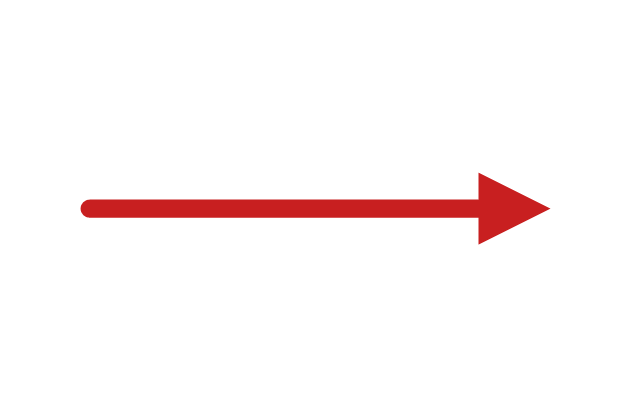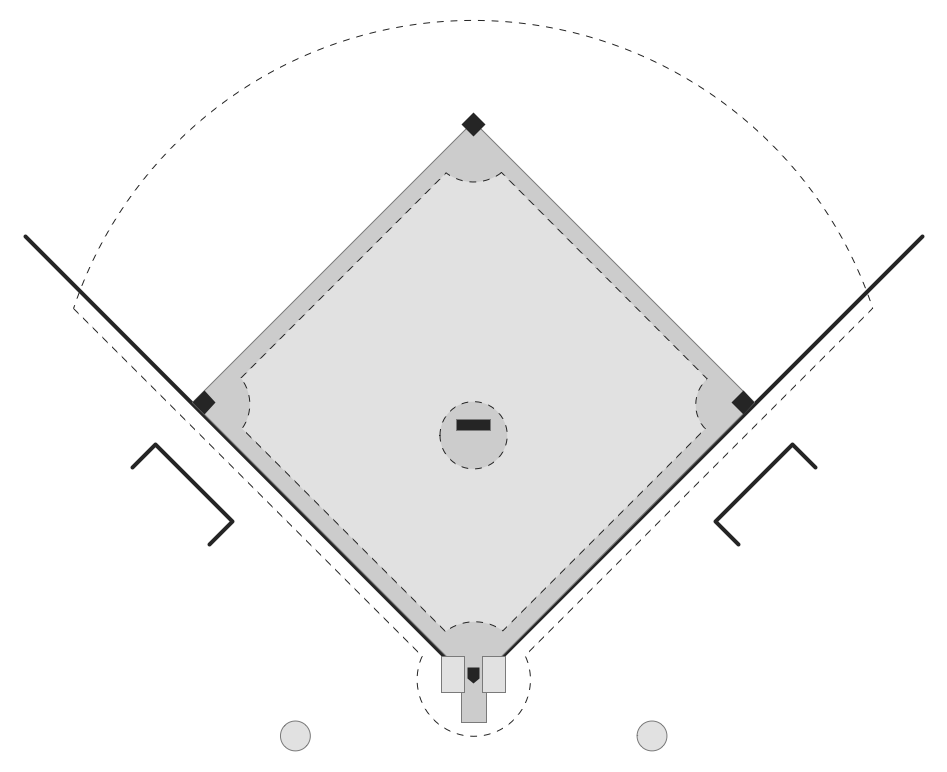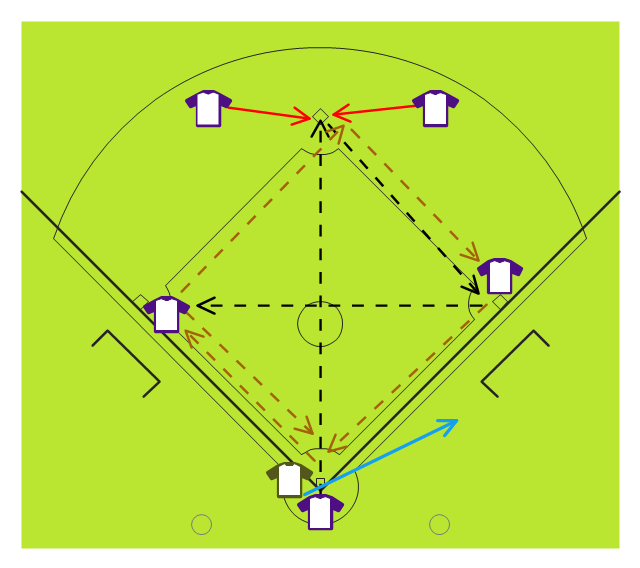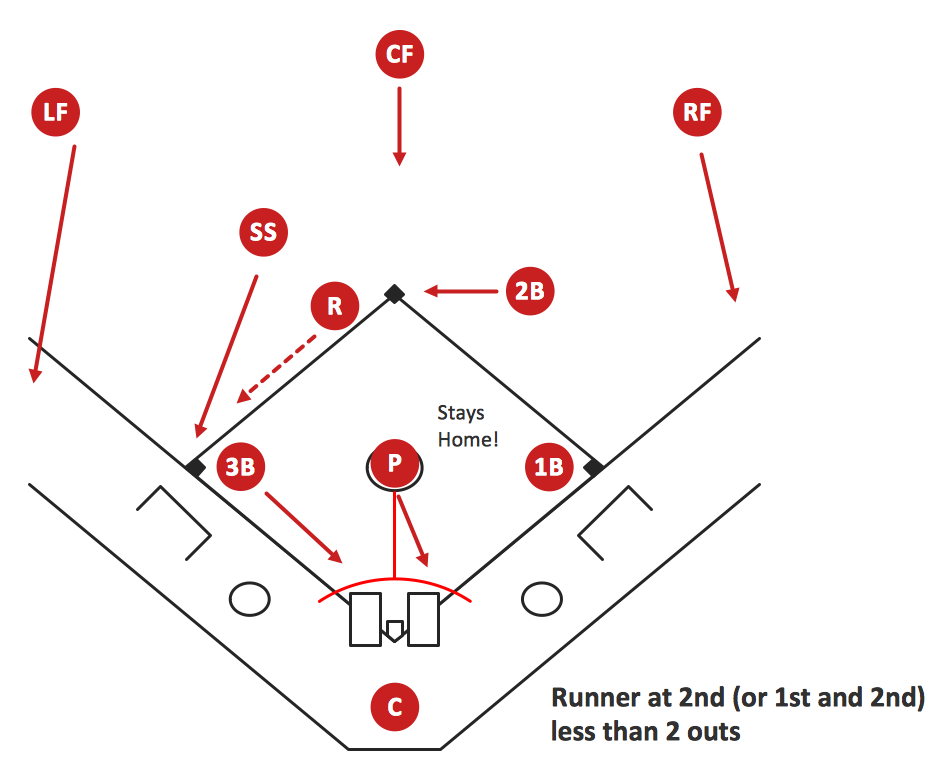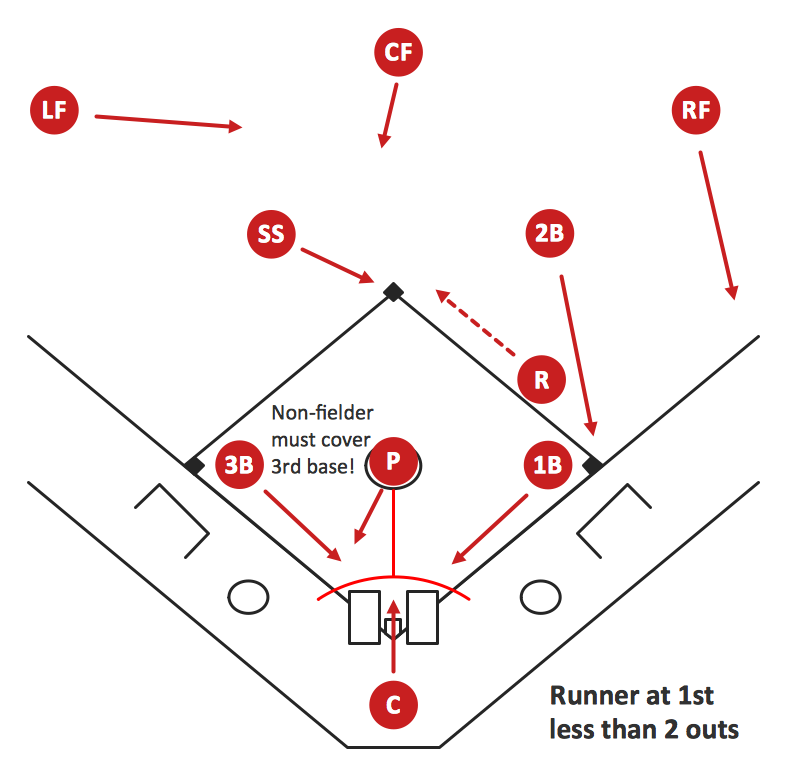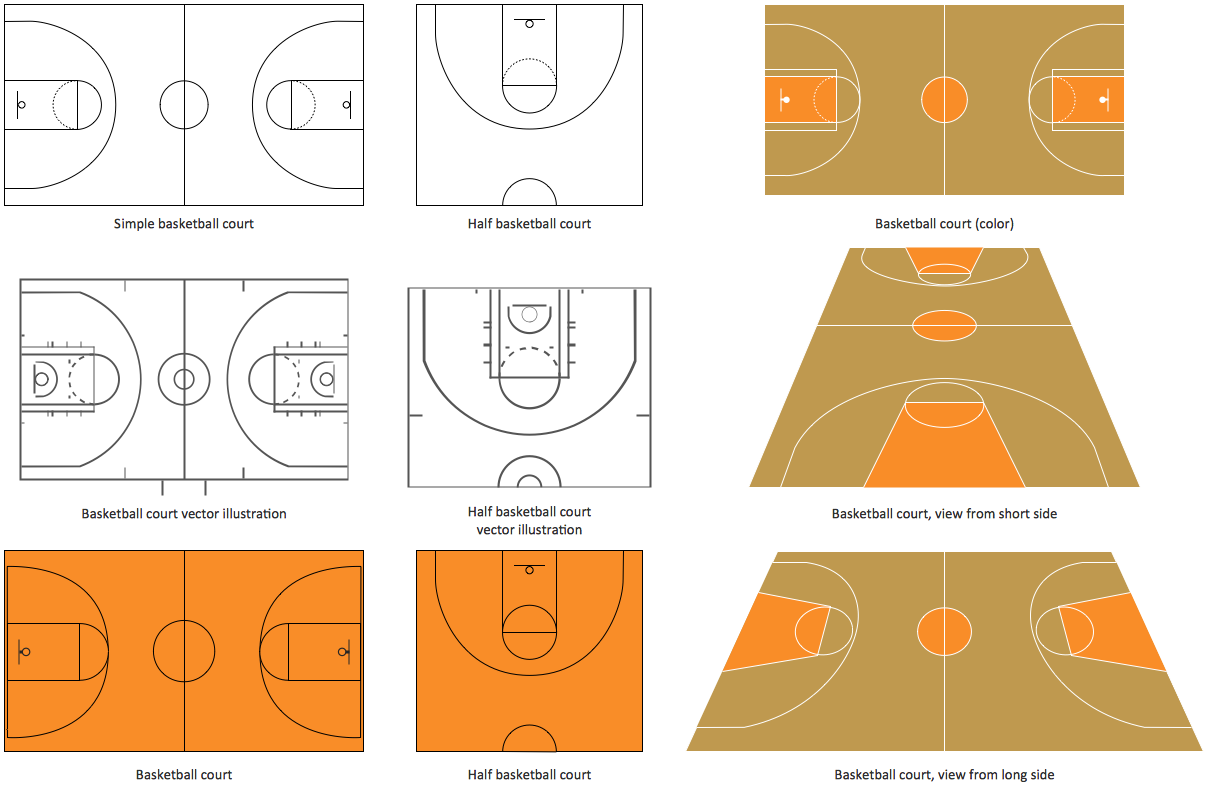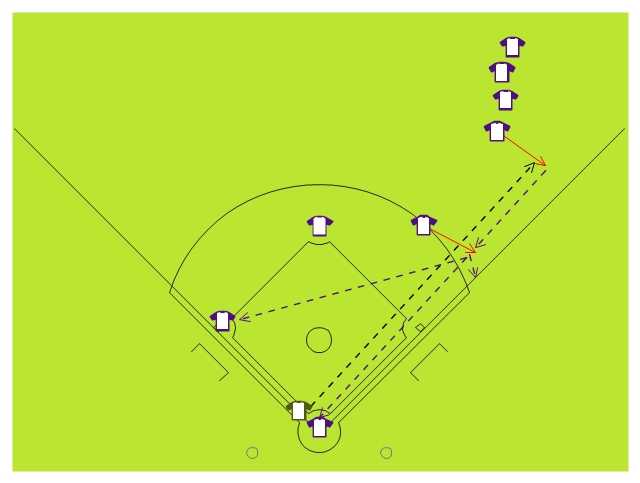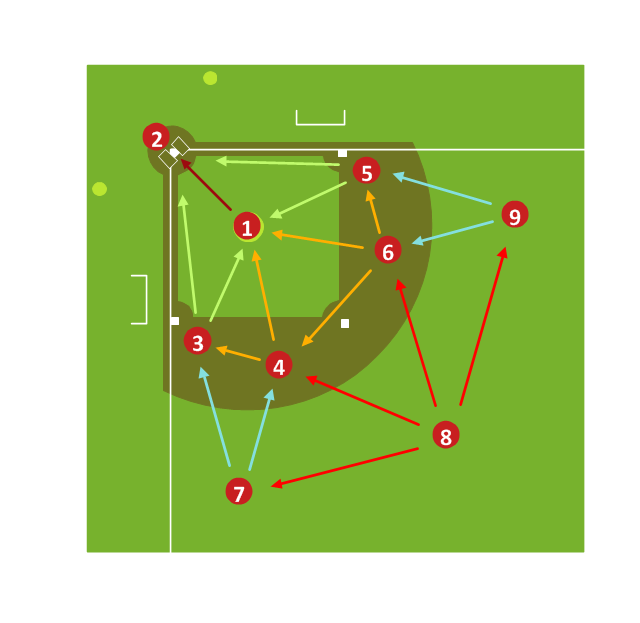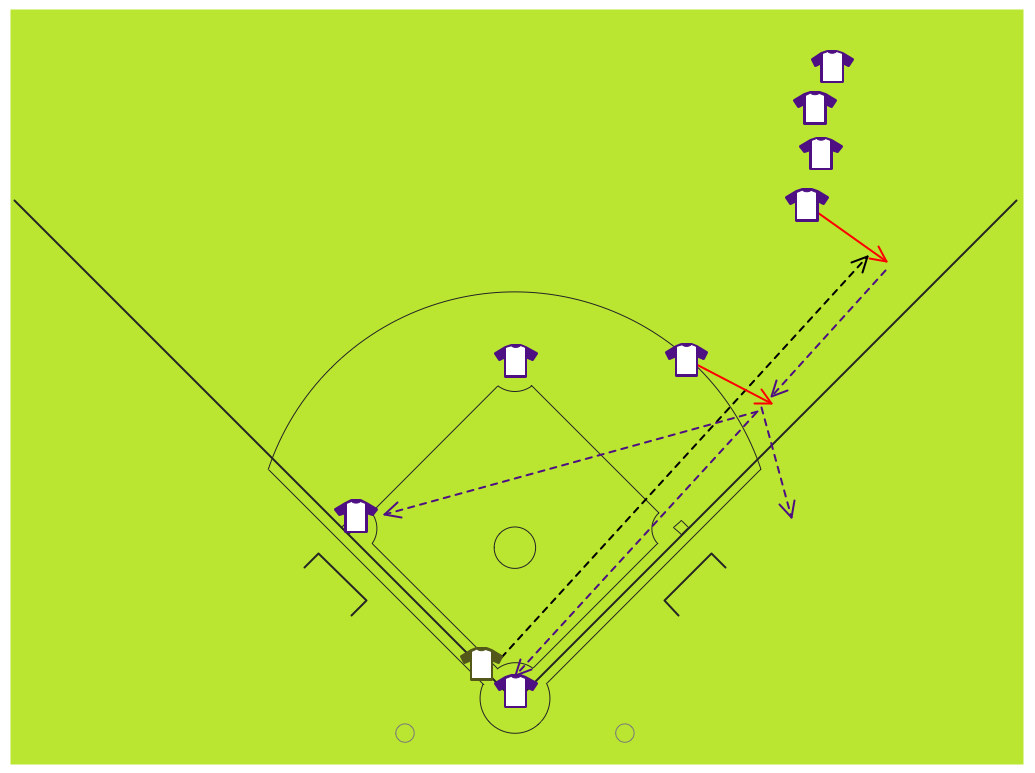Baseball Diagram – Defence Positions
Producing football diagrams using ConceptDraw PRO software takes seconds, not minutes. Thanks to Baseball solution from the Sport area of ConceptDraw Solution Park all you need is just drag and drop ready-to-use positions objects to a template contains baseball field, and place positions on the field.The vector stencils library "Baseball positions" contains 13 symbols: pitcher, catcher, first baseman, second baseman, third baseman, shortstop, left fielder, center fielder, right fielder, baseball position, pointing arrows.
"Baseball is unlike most other competitive sports in that the defense is given control of the ball. Additionally, the number of players on the field at any given time is lopsided in favor of the defense which always has nine players on the field; the offense has between one and four. ...
Each play starts with the ball in the hands of the pitcher, whose job as a member of the defense is to use his skills to somehow prevent the batter from reaching base. The pitcher throws the ball toward the catcher, whose must catch the pitched ball if it is not hit by the batter. In each half-inning, the defense attempts to force three outs.
There are three basic ways in which an out can occur: 1.) If three strikes are recorded against the batter, 2.) if a ball hit by a batter is caught by a defensive player before it hits the ground, or 3.) if a runner who is between bases or has not reached a base to which he is forced is put out by a defensive player in possession of the ball.
If the batter manages to hit the ball, all nine defensive players become active and use the ball in attempting to prevent the batter from reaching base and runners already on base from advancing or scoring. while the offense is busy attempting to move runners around the baseball diamond toward home plate, the defense uses the ball in various ways to achieve outs.
If the defense forces three outs, their team is moved into the offensive role. The exception is if it is the ninth or an extra inning and they are ahead, in which case, the game ends and the defensive team wins." [Defense (sports). Wikipedia]
The symbols example "Design elements - Baseball positions" was created using the ConceptDraw PRO diagramming and vector drawing software extended with the Baseball solution from the Sport area of ConceptDraw Solution Park.
"Baseball is unlike most other competitive sports in that the defense is given control of the ball. Additionally, the number of players on the field at any given time is lopsided in favor of the defense which always has nine players on the field; the offense has between one and four. ...
Each play starts with the ball in the hands of the pitcher, whose job as a member of the defense is to use his skills to somehow prevent the batter from reaching base. The pitcher throws the ball toward the catcher, whose must catch the pitched ball if it is not hit by the batter. In each half-inning, the defense attempts to force three outs.
There are three basic ways in which an out can occur: 1.) If three strikes are recorded against the batter, 2.) if a ball hit by a batter is caught by a defensive player before it hits the ground, or 3.) if a runner who is between bases or has not reached a base to which he is forced is put out by a defensive player in possession of the ball.
If the batter manages to hit the ball, all nine defensive players become active and use the ball in attempting to prevent the batter from reaching base and runners already on base from advancing or scoring. while the offense is busy attempting to move runners around the baseball diamond toward home plate, the defense uses the ball in various ways to achieve outs.
If the defense forces three outs, their team is moved into the offensive role. The exception is if it is the ninth or an extra inning and they are ahead, in which case, the game ends and the defensive team wins." [Defense (sports). Wikipedia]
The symbols example "Design elements - Baseball positions" was created using the ConceptDraw PRO diagramming and vector drawing software extended with the Baseball solution from the Sport area of ConceptDraw Solution Park.
The vector stencils library "Baseball positions" contains 13 symbols: pitcher, catcher, first baseman, second baseman, third baseman, shortstop, left fielder, center fielder, right fielder, baseball position, pointing arrows.
Use it for drawing baseball positions diagrams in the ConceptDraw PRO diagramming and vector drawing software extended with the Baseball solution from the Sport area of ConceptDraw Solution Park.
Use it for drawing baseball positions diagrams in the ConceptDraw PRO diagramming and vector drawing software extended with the Baseball solution from the Sport area of ConceptDraw Solution Park.
Baseball Diagram – Baseball Field – Corner View – Sample
Explaining basics of Baseball is practically impossible without drawing a diagram. If you need to do this more than once you have to choose an appropriate tool allows you to change diagrams easily. ConceptDraw PRO extended with the Baseball Solution is the best choice for this case.Baseball Field Template
ConceptDraw PRO extended with the Baseball solution provides access to libraries, templates and samples allows creating baseball diagrams and schemas. Fields objects are designed according to real fields dimensions. A set of fields samples includes dimensions. All plays and positions diagrams are available as ready-to-modify samples."Fielding Drill #1: Around The World.
The main purpose of this drill is to work on the throws that infielders will be required to make during a game. The catcher will be able to work on throws down to second and third, the middle infielders will work on turning two, and the corner infielders will be able to work on throws home and across the diamond.
How it Works:
This drill is performed with every infield position manned. When the drill is first run it can be done without base runners. Once the drill is practiced a few times then outfielders can be used for base runners. The ball should go “around the world” and back home before the runner makes it all the way around the bases. A game could even be run with a point being awarded to the runners or the infielders depending on who wins."
[baseball-tutorials.com/ baseball-fielding-drills/ ]
The baseball positions diagram example "Baseball fielding drill - Around the world" was created using the ConceptDraw PRO diagramming and vector drawing software extended with the Baseball solution from the Sport area of ConceptDraw Solution Park.
The main purpose of this drill is to work on the throws that infielders will be required to make during a game. The catcher will be able to work on throws down to second and third, the middle infielders will work on turning two, and the corner infielders will be able to work on throws home and across the diamond.
How it Works:
This drill is performed with every infield position manned. When the drill is first run it can be done without base runners. Once the drill is practiced a few times then outfielders can be used for base runners. The ball should go “around the world” and back home before the runner makes it all the way around the bases. A game could even be run with a point being awarded to the runners or the infielders depending on who wins."
[baseball-tutorials.com/ baseball-fielding-drills/ ]
The baseball positions diagram example "Baseball fielding drill - Around the world" was created using the ConceptDraw PRO diagramming and vector drawing software extended with the Baseball solution from the Sport area of ConceptDraw Solution Park.
Infield Positioning for Baseball Situations
Infield Positioning for Baseball Situations - Baseball is very interesting and popular sport game. As each sport game it includes large quantity of game situations, positions and rules. If you are baseball coach or fan, you need convenient and useful software to design the baseball-related diagrams. In this case ConceptDraw PRO diagramming and vector drawing software is a real godsend for you!Baseball Diagram – Basic Bunt Coverage – Runner at 2nd
Drawing baseball diagrams using ConceptDraw PRO software extended with the Baseball solution saves your time, and adds more value to your work. You can easily convert vector drawing to a popular graphic format and then post it to your blog or site. There is no problem to add your logo or text copyright, or use some text comments to make your diagrams unique and recognizable.Baseball Diagram – Basic Bunt Coverage – Runner at 1st
ConceptDraw PRO software extended with the Baseball solution delivers samples with diagrams of the most popular plays in baseball. You can complete this set modifying any sample. All you need is to drag and drop objects to depict another play and then save with the different name. Feel free to add text label with the play name directly to your document.The vector stencils library "Baseball positions" contains 13 symbols: pitcher, catcher, first baseman, second baseman, third baseman, shortstop, left fielder, center fielder, right fielder, baseball position, pointing arrows.
"Baseball is unlike most other competitive sports in that the defense is given control of the ball. Additionally, the number of players on the field at any given time is lopsided in favor of the defense which always has nine players on the field; the offense has between one and four. ...
Each play starts with the ball in the hands of the pitcher, whose job as a member of the defense is to use his skills to somehow prevent the batter from reaching base. The pitcher throws the ball toward the catcher, whose must catch the pitched ball if it is not hit by the batter. In each half-inning, the defense attempts to force three outs.
There are three basic ways in which an out can occur: 1.) If three strikes are recorded against the batter, 2.) if a ball hit by a batter is caught by a defensive player before it hits the ground, or 3.) if a runner who is between bases or has not reached a base to which he is forced is put out by a defensive player in possession of the ball.
If the batter manages to hit the ball, all nine defensive players become active and use the ball in attempting to prevent the batter from reaching base and runners already on base from advancing or scoring. while the offense is busy attempting to move runners around the baseball diamond toward home plate, the defense uses the ball in various ways to achieve outs.
If the defense forces three outs, their team is moved into the offensive role. The exception is if it is the ninth or an extra inning and they are ahead, in which case, the game ends and the defensive team wins." [Defense (sports). Wikipedia]
The symbols example "Design elements - Baseball positions" was created using the ConceptDraw PRO diagramming and vector drawing software extended with the Baseball solution from the Sport area of ConceptDraw Solution Park.
"Baseball is unlike most other competitive sports in that the defense is given control of the ball. Additionally, the number of players on the field at any given time is lopsided in favor of the defense which always has nine players on the field; the offense has between one and four. ...
Each play starts with the ball in the hands of the pitcher, whose job as a member of the defense is to use his skills to somehow prevent the batter from reaching base. The pitcher throws the ball toward the catcher, whose must catch the pitched ball if it is not hit by the batter. In each half-inning, the defense attempts to force three outs.
There are three basic ways in which an out can occur: 1.) If three strikes are recorded against the batter, 2.) if a ball hit by a batter is caught by a defensive player before it hits the ground, or 3.) if a runner who is between bases or has not reached a base to which he is forced is put out by a defensive player in possession of the ball.
If the batter manages to hit the ball, all nine defensive players become active and use the ball in attempting to prevent the batter from reaching base and runners already on base from advancing or scoring. while the offense is busy attempting to move runners around the baseball diamond toward home plate, the defense uses the ball in various ways to achieve outs.
If the defense forces three outs, their team is moved into the offensive role. The exception is if it is the ninth or an extra inning and they are ahead, in which case, the game ends and the defensive team wins." [Defense (sports). Wikipedia]
The symbols example "Design elements - Baseball positions" was created using the ConceptDraw PRO diagramming and vector drawing software extended with the Baseball solution from the Sport area of ConceptDraw Solution Park.
Basketball Court Diagram and Basketball Positions
ConceptDraw PRO software extended with the Basketball solution from the Sport area of ConceptDraw Solution Park provides libraries, templates and samples allowing basketball specialists and fans to draw the professional looking diagrams and schemas of any complexity in a few minutes. It’s very convenient way to explain the different basketball tactics, positions and rules using the visual illustrations."Fielding Drill #2: Hit the Cutoff.
The main purpose of this drill is to work on getting the ball from the outfield into the infield.
How it Works:
This drill requires a fielder at second, at third, a catcher, a cutoff man, and outfielders.
The coach will begin the drill by hitting the ball (in the air or on the ground) to the outfielder. The outfielder will field the ball and throw the ball on a line to the cutoff man (the ball should be aimed at the cutoff’s head). The cutoff should go out to the outfield grass and line-up between home and the outfielder."
[baseball-tutorials.com/ baseball-fielding-drills/ ]
The baseball positions diagram example "Baseball fielding drill - Hit the cutoff" was created using the ConceptDraw PRO diagramming and vector drawing software extended with the Baseball solution from the Sport area of ConceptDraw Solution Park.
The main purpose of this drill is to work on getting the ball from the outfield into the infield.
How it Works:
This drill requires a fielder at second, at third, a catcher, a cutoff man, and outfielders.
The coach will begin the drill by hitting the ball (in the air or on the ground) to the outfielder. The outfielder will field the ball and throw the ball on a line to the cutoff man (the ball should be aimed at the cutoff’s head). The cutoff should go out to the outfield grass and line-up between home and the outfielder."
[baseball-tutorials.com/ baseball-fielding-drills/ ]
The baseball positions diagram example "Baseball fielding drill - Hit the cutoff" was created using the ConceptDraw PRO diagramming and vector drawing software extended with the Baseball solution from the Sport area of ConceptDraw Solution Park.
"Baseball is played between two teams with nine players in the field on each team. On a baseball field, the game is under authority of several umpires. There are usually four umpires in major league games; up to six (and as few as one) may officiate depending on the league and the importance of the game. There are four bases. Numbered counterclockwise, first, second and third bases are cushions (sometimes informally referred to as bags) shaped as 15 in (38 cm) squares which are raised a short distance above the ground; together with home plate, the fourth "base," they form a square with sides of 90 ft (27.4 m) called the diamond. Home base (usually called home plate) is a pentagonal rubber slab 17 in (43.2 cm) wide. The playing field is divided into three main sections:
(1) The infield, containing the four bases, is for general defensive purposes bounded by the foul lines and within the grass line (see figure).
(2) The outfield is the grassed area beyond the infield grass line between the foul lines, and bounded by a wall or fence.
(3) Foul territory is the entire area outside the foul lines.
The pitcher's mound is located in the center of the infield. It is an 18 ft (5.5 m) diameter mound of dirt no higher than 10 in (25.4 cm). Near the center of the mound is the pitching rubber, a rubber slab positioned 60 ft 6 in (18.4 m) from home plate. The pitcher must have one foot on the rubber at the start of every pitch to a batter, but the pitcher may leave the mound area once the ball is released." [Baseball rules. Wikipedia]
The baseball positions diagram example "Corner view baseball field" was created using the ConceptDraw PRO diagramming and vector drawing software extended with the Baseball solution from the Sport area of ConceptDraw Solution Park.
(1) The infield, containing the four bases, is for general defensive purposes bounded by the foul lines and within the grass line (see figure).
(2) The outfield is the grassed area beyond the infield grass line between the foul lines, and bounded by a wall or fence.
(3) Foul territory is the entire area outside the foul lines.
The pitcher's mound is located in the center of the infield. It is an 18 ft (5.5 m) diameter mound of dirt no higher than 10 in (25.4 cm). Near the center of the mound is the pitching rubber, a rubber slab positioned 60 ft 6 in (18.4 m) from home plate. The pitcher must have one foot on the rubber at the start of every pitch to a batter, but the pitcher may leave the mound area once the ball is released." [Baseball rules. Wikipedia]
The baseball positions diagram example "Corner view baseball field" was created using the ConceptDraw PRO diagramming and vector drawing software extended with the Baseball solution from the Sport area of ConceptDraw Solution Park.
"There are 9 fielding positions in baseball. Each position conventionally has an associated number, which is used to score putouts: 1 (pitcher), 2 (catcher), 3 (first baseman), 4 (second baseman), 5 (third baseman), 6 (shortstop), 7 (left fielder), 8 (center fielder), and 9 (right fielder)." [Baseball positions. Wikipedia]
The baseball positions diagram example "Baseball - Defensive fly ball" was created using the ConceptDraw PRO diagramming and vector drawing software extended with the Baseball solution from the Sport area of ConceptDraw Solution Park.
The baseball positions diagram example "Baseball - Defensive fly ball" was created using the ConceptDraw PRO diagramming and vector drawing software extended with the Baseball solution from the Sport area of ConceptDraw Solution Park.
Baseball Diagram – Fielding Drill – Hit the Cutoff
Baseball diagram is the simplest way to explain Baseball details. Plenty rules and terms may startle a newbie. Using visual method to explain the meaning of each term, play or strategy gives a clear understanding. ConceptDraw PRO software extended with the Baseball solution is an amazing tool for producing and presenting baseball diagrams.- Baseball Diagram – Defence Positions | Baseball Field Template ...
- Baseball Diagram – Defence Positions | Design elements - Baseball ...
- Baseball Diagram – Defence Positions | Baseball Diagram ...
- Baseball positions - Vector stencils library | Baseball positions ...
- Baseball positions - Vector stencils library
- Baseball positions - Vector stencils library | Baseball Diagram ...
- Design elements - Football positions (for perspective view) | Design ...
- Baseball positions - Vector stencils library | General window ...
- Baseball Diagram – Defence Positions | Baseball defence positions ...
- Baseball Diagram – Basic Bunt Coverage – Runner at 1st | Basic ...
- Baseball Diagram – Defence Positions | Baseball Diagram ...
- Corner view baseball field | Create Soccer (Football) Positions ...
- Baseball Diamond With 10 Positions
- Basketball Court Diagram and Basketball Positions | Baseball ...
- Baseball | Baseball fields - Vector stencils library | Simple Baseball ...
- Design elements - Baseball positions
- Baseball fielding drill - Hit the cutoff
- Interior Design Sport Fields - Design Elements | Baseball Diagram ...
- Simple Baseball Field – Sample | Baseball Diagram – Defence ...
- Corner view baseball field | Baseball Field Schema | Colored ...
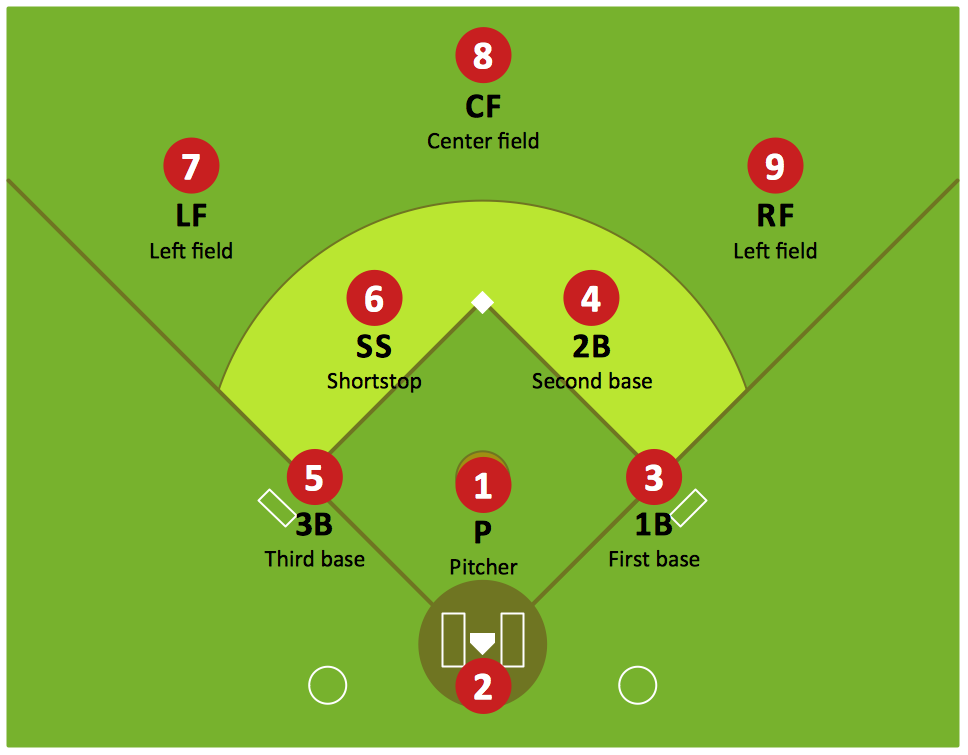
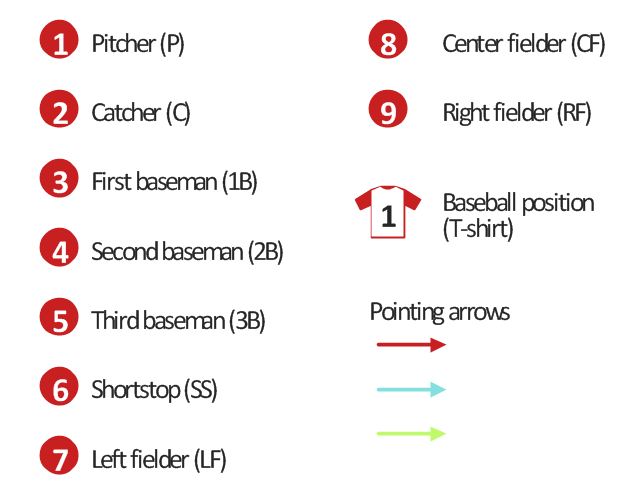
-baseball-positions---vector-stencils-library.png--diagram-flowchart-example.png)
-baseball-positions---vector-stencils-library.png--diagram-flowchart-example.png)
-baseball-positions---vector-stencils-library.png--diagram-flowchart-example.png)
-baseball-positions---vector-stencils-library.png--diagram-flowchart-example.png)
-baseball-positions---vector-stencils-library.png--diagram-flowchart-example.png)
-baseball-positions---vector-stencils-library.png--diagram-flowchart-example.png)
-baseball-positions---vector-stencils-library.png--diagram-flowchart-example.png)
-baseball-positions---vector-stencils-library.png--diagram-flowchart-example.png)
-baseball-positions---vector-stencils-library.png--diagram-flowchart-example.png)
-baseball-positions---vector-stencils-library.png--diagram-flowchart-example.png)
